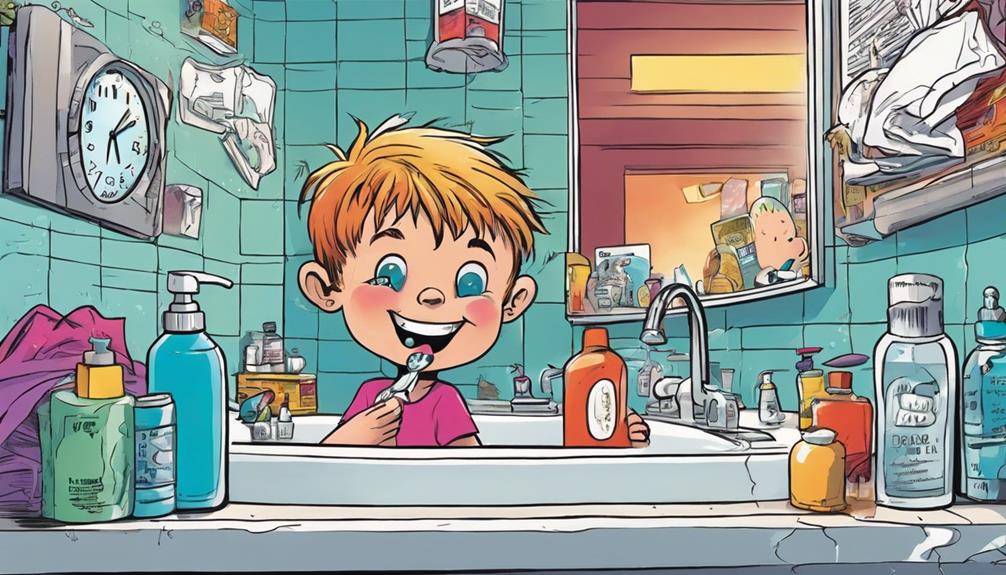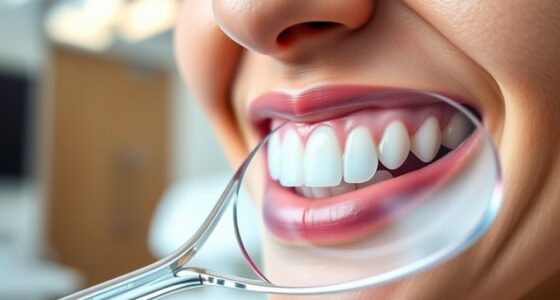Mouthwash can be safe for kids when used properly and at the right age. For children under six, it's best to avoid mouthwash due to their tendency to swallow. The American Dental Association recommends introducing it around age six with adult supervision. Look for alcohol-free and fluoride-free options to minimize risks. Teaching your child how to swish and spit effectively is essential. Regular use can help with plaque and fresh breath, especially for kids with braces. Want to know more about choosing the right mouthwash and ensuring safe usage? There's a lot more to explore!
Key Takeaways
- Mouthwash is generally safe for kids aged six and older, as they can typically swish and spit effectively.
- Choose alcohol-free and fluoride-free mouthwash options to minimize health risks for younger children.
- Supervision is crucial for children aged 6-12 to ensure proper use and prevent swallowing.
- Look for mouthwash with the ADA Seal of Approval to ensure safety and effectiveness.
Age Guidelines for Mouthwash

When it comes to mouthwash, most experts recommend that kids under six shouldn't use it due to their difficulty in swishing and spitting properly. At this age, children often struggle with their swallowing reflexes, making it risky for them to use any mouthwash.
The American Dental Association suggests that once your child reaches the age of six, they can start using mouthwash under adult supervision. This guarantees they can handle the technique correctly and use mouthwash safe for kids.
Pediatric dentists typically assess readiness around ages seven to eight, as children develop better control over their swishing and spitting. It's crucial to choose a safe mouthwash—ideally, one without alcohol and with a lower fluoride concentration. While fluoride mouthwash can be beneficial for older kids, younger children's risk of swallowing it poses significant health concerns.
To prevent accidental ingestion, store mouthwash out of reach and educate your child about its proper use. By following these guidelines, you can help guarantee your child's oral hygiene routine remains safe and effective as they grow.
Safety Considerations for Children

Mouthwash can pose safety risks for children, especially if they don't use it correctly or accidentally swallow it. To guarantee your child is safe while using mouthwash, consider these important guidelines:
- Avoid mouthwash with alcohol; it can irritate their mouth and lead to intoxication if ingested.
- Choose fluoride-free or alcohol-free mouthwash, particularly for younger kids, to minimize health risks.
The American Dental Association (ADA) recommends that children under six shouldn't use mouthwash at all, as swallowing it can lead to nausea and other health issues.
For children under eight, excessive fluoride exposure can result in fluorosis, affecting their dental development.
Always store mouthwash out of reach and educate your child on its proper use to prevent accidental ingestion.
Making oral hygiene a safe and positive experience for your child is essential. By following these safety considerations, you can help guarantee that mouthwash is a beneficial part of their routine.
Choosing the Right Mouthwash

When you're picking a mouthwash for your child, consider the ingredients carefully.
Flavor can make a big difference in whether your kids actually want to use it, so choose options they'll enjoy.
Don't forget to look for the ADA Seal of Approval to guarantee safety and effectiveness.
Ingredients to Consider
Choosing the right mouthwash for kids involves considering key ingredients that guarantee safety and effectiveness. You'll want to prioritize specific features that ascertain your child's oral health is in good hands.
Here are some important ingredients to look for:
- Alcohol-free formulas: These prevent risks associated with ingestion, like nausea and intoxication, making them safer for kids.
- Fluoride: Essential for cavity prevention, fluoride strengthens enamel. Just ascertain your child can avoid swallowing it.
Additionally, steer clear of mouthwashes with harsh ingredients or excessive fluoride, as these can pose risks like fluorosis and other issues with young teeth.
You'll often find kids mouthwash featuring appealing flavors that make rinsing more enjoyable, encouraging regular use. When you choose a mouthwash that combines these elements, you're setting your child up for a positive oral care experience while protecting their teeth.
Flavor Preferences Matter
Kids often prefer mouthwash with fun flavors like grape or bubblegum, making it easier for you to encourage their daily oral hygiene routine. Choosing mouthwash that aligns with their flavor preferences can greatly boost their willingness to use it regularly.
Look for alcohol-free mouthwashes, as these are safer for younger users who might accidentally swallow some. Additionally, consider mouthwashes that contain anticavity fluoride. This ingredient helps strengthen enamel and prevents cavities while remaining suitable for children.
Kid-friendly designs featuring popular cartoon characters can also draw your child's interest, making the experience more engaging. When selecting a mouthwash, verify it has the ADA Seal of Approval. This seal indicates that the product is safe and effective for children's oral health.
Safety Seal Importance
The ADA Seal of Approval is essential for guaranteeing that the mouthwash you select for your child is both safe and effective. This certification indicates that the product meets rigorous safety and efficacy standards.
When choosing the right mouthwash, keep these factors in mind:
- Look for alcohol-free mouthwash to prevent any adverse health effects if swallowed.
- Ensure it contains fluoride for cavity prevention, but only if your child can master swishing and spitting.
Benefits of Mouthwash for Kids

Mouthwash offers various benefits for children's oral health, making it a valuable addition to their daily hygiene routine. Using mouthwash for kids can enhance their oral hygiene by removing food particles and plaque from hard-to-reach areas. Incorporating fluoride mouthwash helps strengthen enamel and aids in remineralization, greatly contributing to cavity prevention.
Regular mouthwash use can also help prevent gingivitis by reducing plaque buildup, which is especially beneficial for children with braces. To guarantee safety, alcohol-free mouthwashes are recommended, as they reduce plaque and gingivitis without the risks associated with alcohol ingestion. Plus, kid-friendly flavors can promote acceptance and encourage children to develop good oral hygiene habits early on.
Here's a quick comparison of mouthwash options:
| Type | Benefits | Recommendations |
|---|---|---|
| Fluoride Mouthwash | Strengthens enamel, prevents cavities | Use daily after brushing |
| Alcohol-Free | Safer for kids, reduces plaque | Ideal for children |
| Kids Anticavity Oral | Promotes good brushing and flossing habits | Fun flavors encourage use |
| Antiseptic Mouthwash | Reduces bacteria, supports gum health | Use as directed |
| Natural Options | Fewer chemicals, gentle on mouths | Check for kid-friendly flavors |
Proper Mouthwash Usage Techniques

Using mouthwash effectively can further enhance the oral hygiene benefits outlined earlier, guaranteeing that children get the most out of their dental care routine. To achieve proper mouthwash usage, follow these essential tips:
- Wait at least 30 minutes after brushing to preserve fluoride benefits.
- Supervise kids under 12 to guarantee they swish and spit correctly, preventing accidental ingestion.
Mouthwash shouldn't replace regular brushing and flossing; it's an adjunct to these crucial practices. By incorporating mouthwash into your child's dental hygiene routine, you can help them develop healthier habits.
Just remember to keep mouthwash out of reach when not in use to prevent any mishaps.
Guaranteeing they understand the importance of proper usage will help reinforce good oral hygiene practices as they grow. With your guidance, they can enjoy the benefits of mouthwash safely and effectively, contributing to their overall dental health.
Signs Your Child Is Ready

Recognizing when your child is ready for mouthwash can set them on the path to better oral hygiene. Children are generally ready to use mouthwash around the age of six, as they usually develop the ability to swish and spit effectively by this age. To help you assess your child's readiness, consider the following signs:
| Sign | Description |
|---|---|
| Age | Typically around six years old |
| Ability to Swish | Can swish water in their mouth |
| Spitting Without Swallowing | Can spit out water without swallowing |
| Frequent Toothpaste Swallowing | If they often swallow toothpaste, wait |
If your child shows these signs, they may be ready to use mouthwash. However, if they frequently swallow toothpaste, it's a sign they might not be prepared yet. Always consult with a pediatric dentist to determine the appropriate timing and type of mouthwash suitable for your child's individual needs. This guidance can guarantee that your child uses mouthwash safely and effectively as part of their dental care routine.
Common Oral Health Issues

Common oral health issues in children, like cavities and gingivitis, can greatly impact their overall well-being and confidence.
Kids under the age of 12 are particularly vulnerable to these problems, often stemming from inadequate oral hygiene practices. Here are some common issues you should watch for:
- Cavities: Affecting about 20% of children aged 5 to 11, cavities can lead to pain and infection if left untreated. Regular dental check-ups can help identify them early.
- Gingivitis: This early form of gum disease is caused by plaque buildup and can lead to discomfort. Using mouthwash as a supplement to brushing and flossing can be effective.
To combat these issues, consider using fluoride mouthwash, but be cautious with kids under the age of six to avoid fluorosis.
Encouraging consistent brushing and regular dental check-ups will help maintain your child's oral health, promoting a brighter, healthier smile.
Recommended Mouthwash Types

When choosing a mouthwash for kids, it's important to contemplate options that prioritize safety and effectiveness. Start by looking for alcohol-free mouthwashes, as they're safer if swallowed and reduce the risk of intoxication. Fluoride mouthwashes, like Listerine® Smart Rinse® Kids and ACT Kids Anticavity, offer extra cavity protection and are suitable for children aged 6 and older.
Consider natural mouthwashes, such as Tom's of Maine, which often feature kid-friendly flavors and ingredients, making them appealing to children. Specialty mouthwashes like TheraBreath for Kids contain xylitol and are formulated without artificial colors or flavors, ensuring they're safe for young users. Always check for the ADA Seal of Approval, which signifies that the mouthwash meets safety and effectiveness standards for children's dental care.
Here's a quick comparison of recommended mouthwash types:
| Type | Key Feature | Example |
|---|---|---|
| Alcohol-Free | Reduces intoxication risk | Colgate Kids Mouthwash |
| Fluoride | Provides cavity protection | Listerine® Smart Rinse® |
| Natural | Kid-friendly flavors | Tom's of Maine |
| Specialty | Xylitol without artificial ingredients | TheraBreath for Kids |
Incorporate these mouthwashes into your child's oral hygiene routine for ideal results.
Timing for First Use

Most experts recommend introducing mouthwash to kids around age six, guaranteeing they can swish and spit effectively without swallowing. This timing for first use is vital, as younger children often lack the coordination needed to use mouthwash safely.
Before you jump in, consider these factors:
- Readiness: Make certain your child can swish and spit without swallowing the mouthwash.
- Pediatric Dentist Consultation: It's wise to consult a pediatric dentist for personalized advice, especially if your child has specific oral health concerns.
Waiting until age six not only helps in developing the necessary skills but also minimizes health risks, like nausea or intoxication, from swallowing mouthwash.
Remember, mouthwash isn't a replacement for brushing; it's an extra step to enhance oral health. Monitoring your child's oral hygiene habits is key to a healthy smile.
Importance of Dental Check-Ups

Regular dental check-ups are vital for keeping your child's smile healthy and catching potential issues before they become serious. Recommended every six months, these visits help monitor your children's oral hygiene and detect early signs of dental problems. By establishing a routine, you can guarantee that any issues are addressed promptly.
The first dentist visit is free for children under three, laying a strong foundation for lifelong dental care. During these check-ups, pediatric dentists provide personalized advice on mouthwash use, helping you choose suitable products for your child. They'll also guide you on maintaining proper oral hygiene practices at home.
X-rays might be used during these visits to spot any underlying concerns, guaranteeing timely intervention if necessary.
It's essential to prioritize these check-ups, as emergency dental care is available 24/7, demonstrating the importance of accessible dental services for your children's health.
Frequently Asked Questions
Is It Safe to Use Mouthwash on Kids?
When considering mouthwash for kids, it's important to assess their age and ability to swish and spit. For those six and older, alcohol-free options with supervision can be safe, but always consult a pediatric dentist.
Why Can't Children Under 6 Use Mouthwash?
Why take the risk? Children under six can't swish and spit properly, leading to swallowing mouthwash. This can cause nausea and other health issues, so it's best to wait until they're older and ready.
What Mouthwash Is Children Safe?
When choosing a mouthwash for kids, look for alcohol-free options, kid-friendly flavors, and the ADA Seal of Approval. For children over six, consider fluoride-containing mouthwash for added cavity protection. Always supervise their use.
What if My 6 Year Old Swallows Mouthwash?
If your 6-year-old swallows mouthwash, watch for symptoms like nausea or vomiting. It's essential to monitor them closely and seek medical advice if symptoms persist or they ingested a large amount. Educate them on proper use.
Is Mouthwash Safe to Use with Electric Toothbrushes for Kids?
Yes, mouthwash is safe to use with electric toothbrushes for kids. It can be a great addition to their oral hygiene routine, as long as it is alcohol-free and safe for their age. Using mouthwash with electric toothbrushes for kids can help kill bacteria and freshen their breath.
Conclusion
To sum up, deciding if mouthwash is safe for kids isn't just about age; it's about empowering your child with good habits. As a parent, it’s important to educate your child on the proper use of mouthwash and to debunk any myths they may have heard about its safety or effectiveness. By teaching them the correct techniques and providing them with information about the benefits of using mouthwash, you can help them develop a healthy oral care routine. Remember, children should always be supervised when using mouthwash and encouraged to spit it out after swishing, rather than swallowing it. With these precautions in place and mouthwash myths debunked, you can feel confident in introducing your child to this important aspect of dental hygiene.
Imagine their bright smile shining with confidence after every rinse! By choosing the right mouthwash and teaching proper usage, you're helping them maintain a healthy mouth.
Don't forget regular dental check-ups to keep their dental health on track.
So, why not make mouthwash a part of their routine and watch those smiles grow even brighter?









